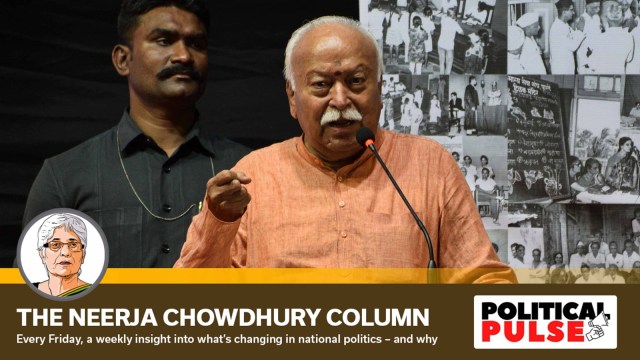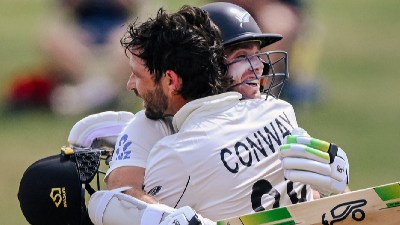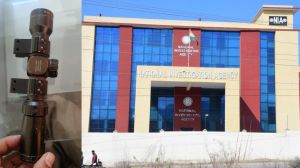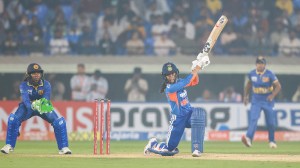Mohan Bhagwat may fire another salvo but Sangh, BJP cannot do without each other
The RSS will hardly wish for the return of the Opposition to dismantle what the BJP has put in place and the ruling party needs the Sangh on its side for the coming Assembly elections.
 Mohan Bhagwat, chief of Hindu nationalist organisation Rashtriya Swayamsevak Sangh (RSS) said, “We should not consider ourselves as God. Let people decide if there’s a God in you.” (Express Archives)
Mohan Bhagwat, chief of Hindu nationalist organisation Rashtriya Swayamsevak Sangh (RSS) said, “We should not consider ourselves as God. Let people decide if there’s a God in you.” (Express Archives)Mohan Bhagwat has made yet another cryptic statements that are being seen in political circles as yet another criticism of Narendra Modi. This time the RSS sarsanghchalak has alluded, again without saying it in so many words, to the Prime Minister’s claim, during the Lok Sabha poll campaign, that he was an “instrument for God to get things done”.
At a meeting in Pune on Thursday, Bhagwat said, “We should not consider ourselves as God. Let people decide if there’s a God in you.” Modi had told an interviewer during the poll campaign, “When my mother was alive, I used to believe that I was born biologically. After she passed away … I am convinced that God has sent me. This energy could not come from biological body, but was bestowed upon me by God … I am an instrument for God to get things done.”
Bhagwat’s latest statement, the third such indirect criticism of the PM after the Lok Sabha elections, came surprisingly after the RSS’s annual meeting in Palakkad, Kerala, also attended by senior BJP leaders such as J P Nadda and B L Santhosh. Earlier, an equally high-level interaction had taken place at Defence Minister Rajnath Singh’s residence, attended by Union Home Minister Amit Shah, Nadda, and RSS leaders. Bhagwat’s latest salvo indicated that for all the meetings, not all issues between the Sangh and its political arm had been sorted out.
Even as Modi has implemented the RSS’s core agenda — Ram temple, Article 370 abrogation, triple talaq, moving towards a Uniform Civil Code — RSS leaders have had reservations about his style of functioning, what they call “vyaktivaad (personality cult)” and excessive power in the hands of one leader. During the parliamentary elections, RSS karyakartas did not campaign for the BJP as enthusiastically as in earlier polls. Some attribute it to the complacency set in by the “400 paar” slogan. Nadda’s remarks that the party no longer needed handholding by the Sangh — he said it in an interview to The Indian Express — was hardly music to Sangh ears.
Yet, neither can the BJP do without the RSS nor can the Sangh do without the party. The RSS will hardly wish for the return of the Congress or the Opposition to dismantle what the BJP has put in place: among other things, people in key positions in government, bureaucracy and academia to carry forward its ideas and its “civilisational” project.
Admitting that it had differences with the BJP, the RSS said after the Palakkad meeting that these would be sorted out “within the family”. The immediate issue before the BJP and the Sangh leadership is who will become the party president after Nadda and Bhagwat’s statement is being seen as an attempt to pressure the BJP brass on this.
The party clearly will have to take the RSS’s views and concerns on board. Various names have been doing the rounds for the party president expected to be in place in the new year: Sunil Bansal, Vinod Tawde, Devendra Fadnavis, Bhupendra Yadav, and Dharmendra Pradhan. Or will the BJP be compelled to opt for one of its more senior leaders — Rajnath Singh, Nitin Gadkari, or Shivraj Singh Chouhan — to take charge if it does not fare well in the four coming Assembly elections?
How RSS took everyone by surprise
The RSS, however, surprised everyone in Palakkad when it came out in favour of a caste census. It called for the use of caste data only for “social welfare” and not for electoral politics, something that is not possible. For, economically and socially empowered Dalits, Adivasis, and OBCs will naturally demand a greater share in the power structure. Besides, if the OBCs find they are 65% of the population — as was the case in Bihar during the caste survey last year — they will not remain satisfied with just 27% reservation in government jobs and education institutions.
With its approval of a caste census, the RSS has come to the BJP’s rescue. The party was sensing the heat from the Opposition’s unrelenting demand for a caste census, which had traction in the Lok Sabha elections. The BJP has to take a call on a caste census. So far it has been ambivalent on it. But, given the rise of the OBCs and Scheduled Castes and Scheduled Tribes, it is likely going to become increasingly difficult for the BJP, or for that matter other political parties, to resist it. The RSS approval may take the sting out of the Opposition’s campaign on it and defang the issue in the coming state elections.
The BJP brass and the Sangh leadership have been worried about the shift of Dalits and OBCs — especially the Extremely Backward Classes (EBCs) — away from them in the recent elections, particularly in UP, and towards the INDIA alliance. From all accounts, in its centenary year, starting on Vijaydashmi Day this year, the RSS plans to especially reach out to the marginalised communities to again bring them over to its side.
Sangh’s shift on caste question
India’s diversity compelled the Communist parties to accept caste — and not just class — as a basis for analysis. In 2015, Bhagwat called for a review of the reservation policy. As a result, the BJP lost the Bihar election to the “arakshanwallas (pro-reservation leaders)”, Lalu Prasad and Nitish Kumar. But last year, the RSS chief said unambiguously that reservation should continue as long as there was discrimination in society, if needed even for “200 years”.
Is this shift on caste a fundamental one or a tactical step back to address a difficult situation? There is an attempt by the RSS to give a different spin to both caste and religion and situate them within the Hindu fold. Last month, RSS-affiliated weekly Panchjanya projected caste as a “unifying” force in Hindu society.
The RSS has also shown the BJP a way out of the impasse over the “sub-classification” in SC and ST quotas ordered by the Supreme Court. It is an issue on which parties such as the Congress and the BJP have been non-committal. The dominant castes among Dalits, who have gained from quotas, have come out against sub-classification that will benefit the more deprived amongst the SCs and STs. The smaller parties representing their interests, including the BSP, RPI, and Chirag Paswan’s LJP (Ram Vilas), have opposed it.
The RSS has called for creating a consensus on it, which will take time and essentially put the issue on the back burner. A leader associated with the RSS had predicted in a private conversation not long after Modi took over as PM, “The real challenge for Modi in the future will come from the extreme Right.”
For the moment, Mandate 2024 requires Modi to depend on his NDA allies. And yet, given the need to win the impending state elections, the BJP can ill afford to have a sulking Sangh on its hands.
(Neerja Chowdhury, Contributing Editor, The Indian Express, has covered the last 11 Lok Sabha elections. She is the author of How Prime Ministers Decide)
- 01
- 02
- 03
- 04
- 05































